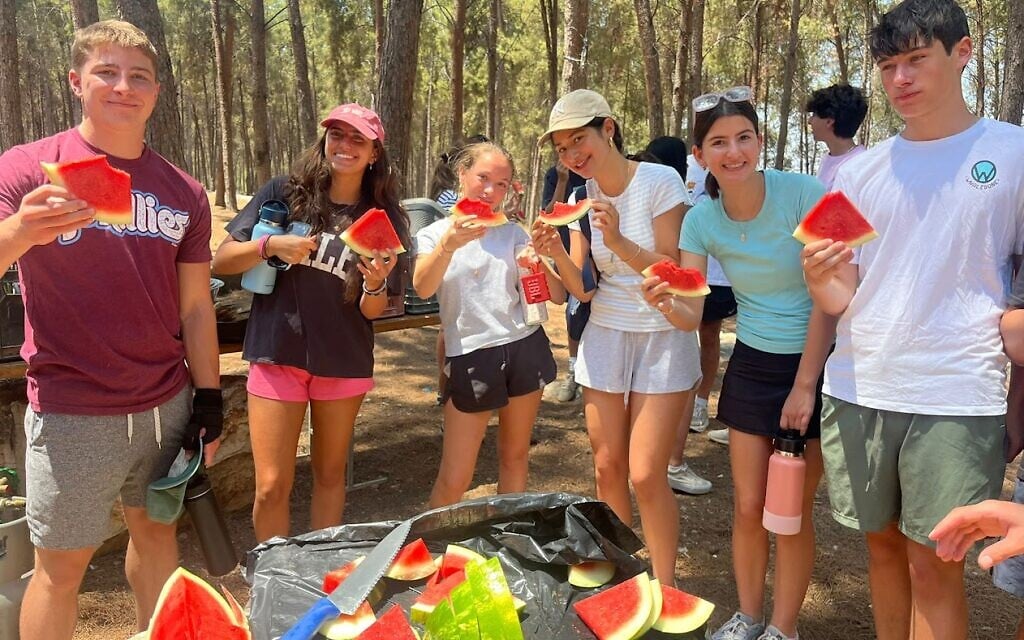The Impact of Conflict on Israel Summer Programs
When Israel launched its strikes against Iranian nuclear and military targets on June 13, Talia Reidler, the CEO of the Kol HaNearim summer program in Israel, made a promise to her participants. She vowed not to let the war interfere with the camp for the 420 kids who had signed up. Her program brings children to volunteer at orphanages and children’s homes across Israel, many of which are run by the religious Zionist women’s organization Emunah.
Reidler recalled, “We bring kids to volunteer at orphanages and children’s homes across Israel, and dozens of homes are counting on our programming and the donations we’ve raised. So I said, unless they cancel our flight, there’s no way we’re not going.” However, just a week before the scheduled departure, El Al canceled all flights. Heartbroken, she informed the families that the program would be canceled.
After the 12-day conflict ended, Reidler hoped to salvage the program but found that about half of the participants had already made other plans. Additionally, a surge in air travel demand made securing tickets seem impossible. This story is not unique; it has become common for Israel trip organizers this summer.
Israel’s Operation Rising Lion against Iran’s nuclear and ballistic missile programs disrupted summer plans for thousands of travelers, including youth registered for educational programs in Israel. Tourism professionals estimate that as many as half of all participants may have postponed or canceled their visits. Despite these challenges, the Kol HaNearim program managed to overcome the complications thanks to Reidler’s perseverance.
“I wrote an email about the importance of our program and sent it to everyone I knew, asking for help,” Reidler said. Through connections with El Al Airlines arranged by campers’ parents, including a meeting with vice chairman Darryl Hagler, the camp was able to book 200 participants on a flight and start the program on June 29, just a few days after the original date. El Al understood the importance of the program and went above and beyond to assist, according to Reidler.
Travel Disappointment and Adjustments
At the beginning of 2025, it seemed like summer programs in Israel would see a recovery after the Hamas-led invasion of October 7, 2023, and the subsequent war in Gaza. However, the conflict with Iran led to a significant drop in participation. Anna Langer, executive director of the Israel Educational Travel Alliance (IETA), noted that only 30,000 participants are expected this year, down from 60,000 previously anticipated.
Langer emphasized that the drop isn’t solely due to fear. Many who canceled still wanted to come but couldn’t reschedule their trips after itineraries changed. Before the pandemic, about 80,000 people participated in Jewish educational trips annually, including Birthright Israel and Honeymoon Israel, as well as Christian programs like Passages and Christians United for Israel.
The IETA, founded in 2020, now represents 140 such programs. It conducts research, shares best practices, and advocates for the travel sector. After the Iran war, IETA helped prepare the ground for program participants to begin as early as July 1, the first day commercial flights to Israel were available to the general public.
Navigating Uncertainty
For the groups that arrived in Israel, many were able to run as planned with only slight modifications. Bnei Akiva’s Mach Hach Ba’aretz program had only six cancellations out of 570 registered participants. Rabbi Dan Katz, the program’s director, spoke with The Times of Israel while visiting the Yad Vashem Holocaust memorial and museum in Jerusalem.
Katz explained that the uncertainty of the war initially caused concern among parents, but the situation stabilized quickly. “By Wednesday, we were able to tell parents that we would run as scheduled. Some had security concerns, but 99% remained committed to the program.”
This year’s group is the largest ever for Bnei Akiva, according to Sharon Shlomo, CEO of The Israel Experience, the tour operator managing the tour. Participants faced uncertainty, but most were determined to go through with their plans.
Pivoting Outside Israel
For RootOne, a non-profit formed in 2020 to make Israel trips more affordable and accessible for teens, the past few months have been challenging. Simon Amiel, RootOne’s executive director, noted that Israel travel has been unpredictable over the last five years. As a temporary measure, RootOne has begun working with Jewish educational programs outside of Israel.
RootOne was founded by Bernie Marcus, a passionate Zionist who saw the need to prepare Jewish youth for college campuses facing antisemitism and anti-Zionism. While Birthright Israel brings over 900,000 young adults to Israel, RootOne focuses on high school students to ensure they are prepared before entering college.
Despite the challenges, RootOne continues to provide vouchers for students to attend Jewish educational programs. This year, about 1,500 students canceled due to the Iran war, but others were able to participate in tours outside Israel, such as in Prague, Paris, and London. Amiel believes these alternatives offer value, even if they can’t match the immersive experience of being in Israel.



